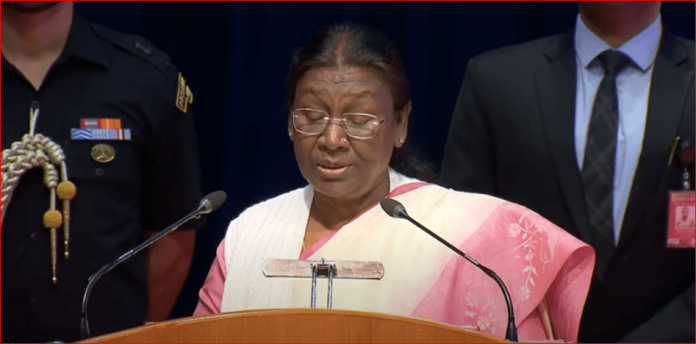President Droupadi Murmu on Sunday urged the judiciary to adopt a citizen-centric approach to improve access to justice, ensuring that the system catered to the needs of people.
Unveiling a statue of the Architect of the Indian Constitution, Dr. Bhim Rao Ambedkar, at the Supreme Court premises on the occasion of the 74th Constitution Day of India, the President hailed the Supreme Court for playing the role of the final interpreter of the country’s founding document (Constitution) to the perfection.
She said like the Indian Constitution, the Supreme Court of India has also been a model to many countries. With a vibrant judiciary, she said she was sure that the health of Indian democracy would never be of concern.
The President further appreciated the efforts taken by the Apex Court in making judgments available in regional languages, saying that the step would enhance accessibility and strengthen equality.
She further commended the live webcast of court proceedings, calling it a measure that transformed citizens into true stakeholders of the judicial system.
Highlighting the living nature of the Constitution, she said its vitality was sustained through practical implementation.
Stressing on speeding up the process of decolonisation in other spheres, the President said it would have better results by involving the youth.
She urged the youth to learn about the visionaries like Dr Bhim Rao Ambedkar, emphasising that an understanding of transformative historical figures ensured the future of the republic remained in safe hands.
Calling the Constitution a ‘living document,’ she said it remained alive only when its contents were put in practice.
Expressing her innate desire to support the young, talented and loyal individuals of the country, the President came up with the idea of an All India Judicial Service examination on the lines of civil services examination.
She said just like there was an All India examination for those aspiring to become IAS and IPS officers, the same opportunity should be extended to those aspiring to serve in the judiciary. There should be an All India Judicial Service examination, which can select brilliant young stars and nurture and promote their talent from the lawyer level to the higher level.
She added that she left it to the wisdom of those in the judiciary to devise any effective mechanism that they deem fit to achieve the strengthening of the justice delivery system.
Reflecting on the historical significance of the day, the President emphasised the values enshrined in the Indian Constitution.
She commemorated the adoption of the Constitution in 1949 after three years of deliberation, saying that the transition from Law Day to Constitution Day symbolised a deeper commitment to the principles that guided the nation.
She underscored the core values of justice, liberty, equality, and fraternity, as highlighted in the Preamble, stating that these principles formed the bedrock on which the nation conducted itself.
Calling the Indian democracy the largest of its kind globally, she said it exemplified diversity and inclusivity.
The event was attended by Chief Justice of India D.Y. Chandrachud, Union Minister of State for Law and Justice Arjun Ram Meghwal, Supreme Court judge Justice Sanjay Kishan Kaul, Attorney General for India R. Venkataramani and Supreme Court Bar Association (SCBA) President Dr. Adish C. Aggarwala.


